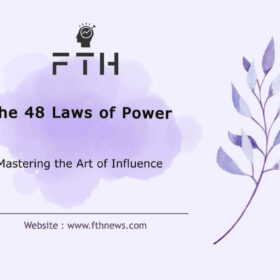
Questions to Ask Yourself: Are you eager to uncover your true self and unlock your full potential? Look no further than this comprehensive guide inspired by Manoj Chenthamarakshan’s insightful book, “55 Questions to Ask Yourself.” Through a series of thought-provoking inquiries, you’ll embark on a transformative journey of self-discovery and personal growth, empowering you to set meaningful goals, recognize life-changing opportunities, develop productive habits, and celebrate your achievements.
Understand Yourself, Understand Your Path
The relationship you have with yourself is the most important one. No one can motivate you to become the best version of yourself better than you can. This guide will assist you in your journey of self-discovery and self-acceptance, helping you understand who you are, what you’re capable of, and what steps you need to take to improve.
Uncover Your True Identity
Self-discovery is the first step toward finding the right direction for a better life. This process may be long and exhausting, but your hard work and patience will pay off immensely. Understanding your true self allows you to live authentically and align your actions with your core values. By answering a series of introspective questions, you’ll uncover your true character, identify your strengths and weaknesses, and develop a deeper appreciation for your thoughts and abilities.
The journey of self-discovery isn’t just about finding out who you are; it’s also about understanding why you do what you do and what drives you. It’s about peeling back the layers to reveal your core beliefs, values, and desires. Through this process, you can make more informed decisions, build stronger relationships, and find greater fulfillment in your everyday life.
Key Questions to Ask Yourself for Self-Discovery:
- Who am I, and what defines my identity?
Reflect on your personal history, values, beliefs, and the roles you play in different aspects of your life. Consider how these elements shape who you are today. - Who are my top three role models, and what do I admire about them?
Identifying your role models can give insight into the qualities you value and aspire to cultivate in yourself. - What are my top three strengths, and how can I leverage them?
Understanding your strengths helps you to use them effectively in various situations, boosting your confidence and performance. - What is the most challenging experience I’ve faced, and how did I overcome it?
Reflecting on past challenges and your responses can reveal your resilience, problem-solving skills, and areas for growth. - What hobbies or interests bring me joy and fulfillment?
Knowing what activities you enjoy helps you to prioritize your time and energy towards pursuits that enhance your well-being and happiness. - What qualities do I like about myself, and how can I cultivate them further?
Acknowledging and nurturing your positive traits can lead to greater self-acceptance and personal growth. - If I had all the resources in the world, what would I do?
This question helps you to dream big and understand your true passions and aspirations without the constraints of reality. - What is the one thing I cannot live without?
Identifying your non-negotiables can help you prioritize what’s most important in your life, guiding your decisions and actions.
By exploring these questions, you can gain a clearer understanding of your true identity. This self-awareness is the foundation for personal growth, helping you to set meaningful goals, recognize opportunities, and develop productive habits. Embrace this journey of self-discovery, and you’ll unlock your full potential, leading to a more fulfilling and purposeful life.
Set Meaningful Goals, Achieve Lasting Success
Achieving your goals can be challenging when you’re unclear about what you want and how to accomplish it. Clear, well-defined goals provide a sense of direction and purpose, enabling you to focus your efforts and measure your progress. This guide will show you how to set specific, actionable goals that align with your true passions and capabilities. By answering a series of goal-oriented questions, you’ll gain clarity on your motivations, create a realistic timeline, and develop strategies to stay motivated and on track.
Setting meaningful goals involves more than just deciding what you want; it requires understanding why you want it and how you’ll get there. Goals that resonate with your personal values and passions are more likely to inspire sustained effort and commitment. Additionally, breaking down larger goals into smaller, manageable tasks can help you maintain momentum and avoid feeling overwhelmed.
Key Questions to Ask Yourself for Goal-Setting:
- What fulfills me, and what do I enjoy the most as a person?
Identifying what brings you joy and satisfaction helps ensure your goals are aligned with your intrinsic motivations, making them more sustainable. - What are my capabilities, and how can I leverage my natural talents?
Understanding your strengths allows you to set goals that maximize your potential and build on what you naturally do well. - What other sources of motivation can I tap into?
Recognizing additional sources of inspiration and support, such as mentors, peers, or rewarding milestones, can help maintain your drive. - What is my ideal timeframe for achieving this goal?
Establishing a realistic timeline for your goals helps you plan effectively and stay focused, providing a sense of urgency without overwhelming pressure. - What comes next after I accomplish this goal?
Considering the next steps ensures that your journey doesn’t end with the achievement of one goal but continues with new challenges and aspirations. - How can I motivate myself to take consistent action every day?
Developing daily habits and routines that support your goals can help maintain progress and keep you accountable. This might include setting daily tasks, visualizing success, or celebrating small wins.
By exploring these questions, you can create a clear, actionable plan for achieving your goals. Remember, setting meaningful goals is a dynamic process that involves continuous reflection and adjustment. Stay flexible and open to change as you learn and grow, and you’ll be better equipped to achieve lasting success.
Recognize and Seize Opportunities
In life, we all encounter opportunities, but successful people know how to recognize and capitalize on them effectively. Opportunities often come disguised as challenges or ordinary situations, requiring a keen eye and proactive mindset to identify and seize them. This guide will help you develop an eye for potential, enabling you to see the possibilities in even the most mundane scenarios. By answering a series of questions, you’ll learn to identify the resources, support, and strategies you need to turn your ideas into reality.
Recognizing opportunities involves being aware of your environment, staying curious, and maintaining a positive attitude. It’s about looking beyond the obvious and seeing the potential for growth and improvement in every situation. Additionally, having the confidence to take calculated risks and the resilience to overcome setbacks is crucial for turning opportunities into successful outcomes.
Key Questions to Ask Yourself for Opportunity Recognition:
- What do I need to succeed, and how can I obtain it?
Understanding your specific needs, whether they are resources, skills, or knowledge, helps you focus your efforts on acquiring what is essential for your success. - What resources or skills do I already possess that I can leverage?
Identifying your existing assets allows you to use them strategically, maximizing your potential without needing to start from scratch. - Who can I turn to for help, and how can they support me?
Building a network of mentors, peers, and experts can provide valuable guidance, feedback, and resources, making it easier to navigate challenges and seize opportunities. - What is the best opportunity for me, and how can I maximize its potential?
Evaluating and prioritizing opportunities based on your goals and capabilities ensures that you focus on the ones that offer the most significant potential for growth and success. - What can I do to make the process easier and faster?
Streamlining your approach, whether through efficient planning, leveraging technology, or delegating tasks, can help you act on opportunities more effectively and achieve quicker results.
By exploring these questions, you can develop a proactive mindset that allows you to recognize and seize opportunities as they arise. Remember, opportunities are often time-sensitive, so being prepared and willing to act swiftly can make all the difference. Stay alert, be adaptable, and keep an open mind, and you’ll be well on your way to transforming potential opportunities into tangible achievements.
Take Decisive Action, Overcome Obstacles
Ideas are only half the equation; the other half is knowing what to do to make them a reality. Transforming your goals and opportunities into tangible progress requires clear planning, proactive problem-solving, and unwavering discipline. This guide will teach you how to turn your aspirations into concrete achievements by helping you overcome obstacles and stay focused on your objectives. By answering a series of action-oriented questions, you’ll develop a clear plan, anticipate potential challenges, and maintain the discipline necessary to achieve your dreams.
Taking decisive action means committing to your goals and consistently working towards them, even when faced with difficulties. It involves breaking down your larger goals into manageable steps, setting priorities, and creating a structured timeline. Additionally, maintaining flexibility and adaptability allows you to adjust your plans as needed without losing sight of your ultimate objectives.
Key Questions to Ask Yourself for Decisive Action:
- What is my goal for this year, this quarter, and this week?
Setting short-term, mid-term, and long-term goals helps you create a roadmap for your journey, ensuring that you have clear milestones to aim for. - What resources or tools do I need to get started?
Identifying the necessary resources, whether they are physical tools, skills, or support systems, enables you to gather everything you need to initiate your plan effectively. - What potential distractions or obstacles might I face, and how can I prepare for them?
Anticipating challenges and distractions allows you to develop contingency plans and strategies to stay focused and resilient in the face of setbacks.
In addition to these questions, consider the following strategies to enhance your ability to take decisive action and overcome obstacles:
- Create a Detailed Action Plan:
Outline the specific steps required to achieve your goals, including deadlines and checkpoints to track your progress. - Stay Accountable:
Share your goals with a trusted friend, mentor, or accountability partner who can provide support and encouragement, helping you stay on track. - Cultivate a Growth Mindset:
Embrace challenges as opportunities for learning and growth. View setbacks as temporary and solvable rather than insurmountable obstacles. - Prioritize Self-Care:
Maintain your physical and mental well-being through regular exercise, healthy eating, adequate sleep, and stress management techniques. A healthy body and mind are crucial for sustained focus and productivity.
By addressing these questions and implementing these strategies, you can turn your goals and ideas into actionable plans. Taking decisive action and overcoming obstacles is a dynamic and ongoing process that requires persistence, adaptability, and a positive mindset. Stay committed to your path, and you’ll be well on your way to achieving your dreams.
Cultivate Productive Habits, Achieve Lasting Change
Your habits are the foundation of your success. Developing good habits and eliminating bad ones is crucial for personal growth and improvement. Positive habits create a structure that supports your goals, while negative habits can undermine your progress. This guide will help you identify the habits holding you back and guide you in adopting new, productive behaviors that align with your goals. By answering a series of habit-focused questions, you’ll learn to build self-discipline, consistency, and a positive mindset.
Cultivating productive habits requires a clear understanding of your current behaviors, a strong commitment to change, and a systematic approach to developing new routines. It’s important to start small, making incremental changes that are sustainable over the long term. Consistency is key, as repeated actions become automatic over time, forming the backbone of your daily life and contributing to lasting success.
Key Questions to Ask Yourself for Habit Formation:
- What are my bad habits, and how can I eliminate them?
Identifying detrimental habits is the first step toward change. Develop strategies to replace these behaviors with healthier alternatives, such as avoiding triggers or creating positive associations. - What good habits should I develop, and how can I adopt them consistently?
Determine which habits will most effectively support your goals. Start by incorporating small, manageable actions into your daily routine, gradually building them into lasting habits. - How can I stay committed and disciplined in my habit-building journey?
Staying committed involves setting clear intentions, monitoring your progress, and rewarding yourself for small victories. Use tools like habit trackers, reminders, and accountability partners to stay on course.
In addition to these questions, consider the following strategies to enhance your habit formation process:
- Set Clear and Specific Goals:
Define what you want to achieve with your new habits and create a detailed plan to reach these goals. Specificity increases the likelihood of success. - Use Triggers and Cues:
Associate your new habits with existing routines or specific times of day. Triggers and cues can help you remember and stick to your new behaviors. - Practice Patience and Persistence:
Habits take time to form. Be patient with yourself and persistent in your efforts. Over time, consistency will lead to automatic and ingrained behaviors. - Reflect and Adjust:
Regularly evaluate your progress and make adjustments as needed. If a particular approach isn’t working, try a different strategy or seek feedback from others.
By addressing these questions and implementing these strategies, you can effectively cultivate productive habits that support your long-term success. Remember, habit formation is an ongoing process that requires dedication and resilience. Stay focused on your goals, and over time, your new habits will become the foundation for lasting change and personal growth.
Celebrate Your Achievements, Stay Motivated
Happiness is the ultimate goal, but it’s not something that can be found solely in the destination. True fulfillment comes from the journey itself and the small victories along the way. Celebrating your accomplishments, no matter how big or small, is essential for maintaining motivation and a positive, grateful mindset that fuels your continued growth and success. Recognizing your achievements helps you build momentum, reinforce positive behaviors, and stay inspired to reach your goals.
Celebration is not just about the end result; it’s about acknowledging the effort, progress, and perseverance that brought you there. By taking time to appreciate your journey and milestones, you cultivate a sense of gratitude and joy that enhances your overall well-being and keeps you motivated for future challenges.
Key Questions for Celebration:
- What are some of my most significant achievements in life?
Reflecting on your past successes can provide a sense of pride and perspective, reminding you of your capabilities and the progress you’ve made. - How will I celebrate when I achieve my goal?
Planning a reward or celebration for reaching a milestone gives you something to look forward to and reinforces your commitment to your goals. - How can I share my achievements with others to amplify my happiness?
Sharing your successes with friends, family, or a supportive community can enhance your joy and provide additional motivation through positive reinforcement and encouragement. - What is the ultimate secret to being truly happy?
True happiness often comes from a combination of personal fulfillment, meaningful relationships, and a sense of purpose. Reflect on what brings you joy and how you can incorporate more of it into your daily life.
Embrace the Journey, Unlock Your Potential
Self-improvement is not a one-time event but a lifelong journey of growth and discovery. By continuously applying the knowledge and strategies outlined in this guide, you’ll embark on a transformative path toward becoming the best version of yourself. Remember, your actions will determine the true impact of these lessons, so embrace the process, stay curious, and keep striving for excellence. The keys to unlocking your full potential lie within you – it’s time to unlock them.
Celebrating your achievements and staying motivated involves a blend of self-reflection, gratitude, and ongoing commitment to your goals. By appreciating the journey and the progress you make, you can maintain a positive outlook and continue to grow and evolve. Keep recognizing your milestones, sharing your successes, and nurturing a mindset of continuous improvement. This approach will help you stay motivated and achieve lasting success.














